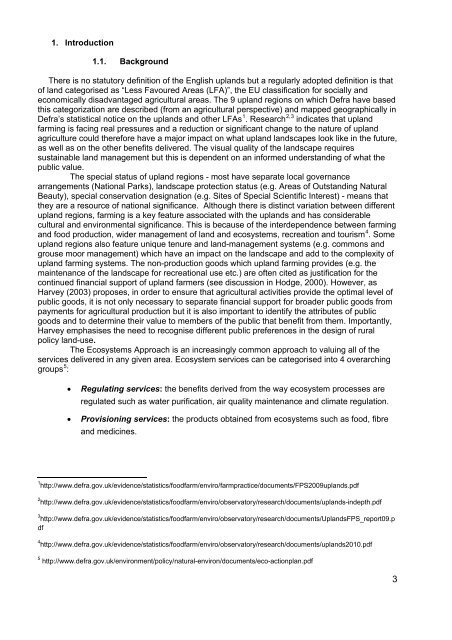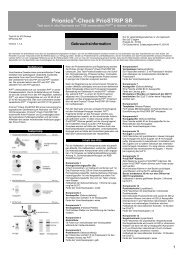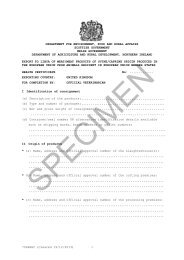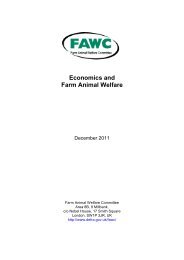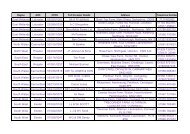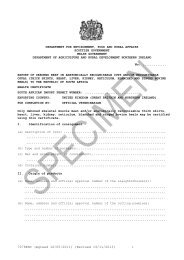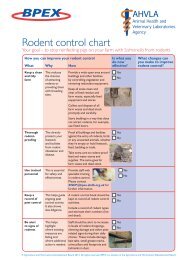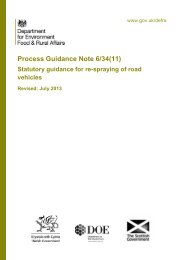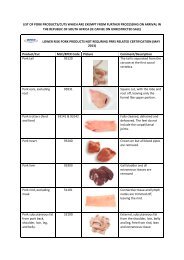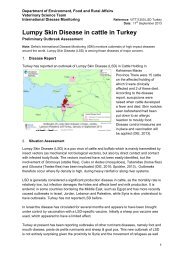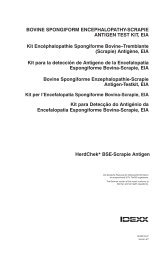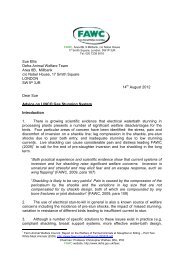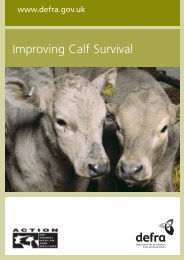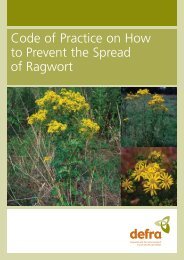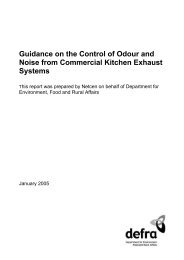Public Attitudes and Preferences for Upland Landscapes - Defra
Public Attitudes and Preferences for Upland Landscapes - Defra
Public Attitudes and Preferences for Upland Landscapes - Defra
You also want an ePaper? Increase the reach of your titles
YUMPU automatically turns print PDFs into web optimized ePapers that Google loves.
1. Introduction<br />
1.1. Background<br />
There is no statutory definition of the English upl<strong>and</strong>s but a regularly adopted definition is that<br />
of l<strong>and</strong> categorised as “Less Favoured Areas (LFA)”, the EU classification <strong>for</strong> socially <strong>and</strong><br />
economically disadvantaged agricultural areas. The 9 upl<strong>and</strong> regions on which <strong>Defra</strong> have based<br />
this categorization are described (from an agricultural perspective) <strong>and</strong> mapped geographically in<br />
<strong>Defra</strong>’s statistical notice on the upl<strong>and</strong>s <strong>and</strong> other LFAs 1 . Research 2,3 indicates that upl<strong>and</strong><br />
farming is facing real pressures <strong>and</strong> a reduction or significant change to the nature of upl<strong>and</strong><br />
agriculture could there<strong>for</strong>e have a major impact on what upl<strong>and</strong> l<strong>and</strong>scapes look like in the future,<br />
as well as on the other benefits delivered. The visual quality of the l<strong>and</strong>scape requires<br />
sustainable l<strong>and</strong> management but this is dependent on an in<strong>for</strong>med underst<strong>and</strong>ing of what the<br />
public value.<br />
The special status of upl<strong>and</strong> regions - most have separate local governance<br />
arrangements (National Parks), l<strong>and</strong>scape protection status (e.g. Areas of Outst<strong>and</strong>ing Natural<br />
Beauty), special conservation designation (e.g. Sites of Special Scientific Interest) - means that<br />
they are a resource of national significance. Although there is distinct variation between different<br />
upl<strong>and</strong> regions, farming is a key feature associated with the upl<strong>and</strong>s <strong>and</strong> has considerable<br />
cultural <strong>and</strong> environmental significance. This is because of the interdependence between farming<br />
<strong>and</strong> food production, wider management of l<strong>and</strong> <strong>and</strong> ecosystems, recreation <strong>and</strong> tourism 4 . Some<br />
upl<strong>and</strong> regions also feature unique tenure <strong>and</strong> l<strong>and</strong>-management systems (e.g. commons <strong>and</strong><br />
grouse moor management) which have an impact on the l<strong>and</strong>scape <strong>and</strong> add to the complexity of<br />
upl<strong>and</strong> farming systems. The non-production goods which upl<strong>and</strong> farming provides (e.g. the<br />
maintenance of the l<strong>and</strong>scape <strong>for</strong> recreational use etc.) are often cited as justification <strong>for</strong> the<br />
continued financial support of upl<strong>and</strong> farmers (see discussion in Hodge, 2000). However, as<br />
Harvey (2003) proposes, in order to ensure that agricultural activities provide the optimal level of<br />
public goods, it is not only necessary to separate financial support <strong>for</strong> broader public goods from<br />
payments <strong>for</strong> agricultural production but it is also important to identify the attributes of public<br />
goods <strong>and</strong> to determine their value to members of the public that benefit from them. Importantly,<br />
Harvey emphasises the need to recognise different public preferences in the design of rural<br />
policy l<strong>and</strong>-use.<br />
The Ecosystems Approach is an increasingly common approach to valuing all of the<br />
services delivered in any given area. Ecosystem services can be categorised into 4 overarching<br />
groups 5 :<br />
• Regulating services: the benefits derived from the way ecosystem processes are<br />
regulated such as water purification, air quality maintenance <strong>and</strong> climate regulation.<br />
• Provisioning services: the products obtained from ecosystems such as food, fibre<br />
<strong>and</strong> medicines.<br />
1 http://www.defra.gov.uk/evidence/statistics/foodfarm/enviro/farmpractice/documents/FPS2009upl<strong>and</strong>s.pdf<br />
2 http://www.defra.gov.uk/evidence/statistics/foodfarm/enviro/observatory/research/documents/upl<strong>and</strong>s-indepth.pdf<br />
3 http://www.defra.gov.uk/evidence/statistics/foodfarm/enviro/observatory/research/documents/Upl<strong>and</strong>sFPS_report09.p<br />
df<br />
4 http://www.defra.gov.uk/evidence/statistics/foodfarm/enviro/observatory/research/documents/upl<strong>and</strong>s2010.pdf<br />
5 http://www.defra.gov.uk/environment/policy/natural-environ/documents/eco-actionplan.pdf<br />
3


